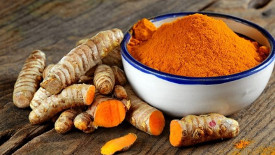 Recent news reports say that one of the world’s largest producers of turmeric adds a lead-laced compound to it before selling it. This producer on Bangladesh adds lead chromate to the powder.
Recent news reports say that one of the world’s largest producers of turmeric adds a lead-laced compound to it before selling it. This producer on Bangladesh adds lead chromate to the powder.
Turmeric itself is extremely healthful and has many beneficial effects as part of the diet. But people in Bangladesh have been consuming it, along with the lead in the additive and are showing many health issues as a result.
Lead is a neurotoxin, and increases the risk of heart and brain disease in adults and interferes with children’s brain development.
An article at Futurity.org states: “Unlike other metals, there is no safe consumption limit for lead, it’s a neurotoxin in its totality,” says the papers’ senior author Stephen Luby, professor of medicine and the director of research for the Center for Innovation in Global Health. “We cannot console ourselves proposing that if the contamination were down to such and such level, it would have been safe.”
The researchers did not find direct evidence of contaminated turmeric beyond Bangladesh, and they point out that food safety checks by the importing countries have incentivized large-scale Bangladesh spice processors to limit the amount of lead added to turmeric destined for export. However, the researchers caution, “the current system of periodic food safety checks may catch only a fraction of the adulterated turmeric being traded worldwide.”
In fact, since 2011, more than 15 brands of turmeric—distributed to countries including the US—have been recalled due to excessive levels of lead.
Researchers and others worldwide are working to find solutions to the problem, but in the meantime, check labels to find out the origin of the turmeric you buy. Whenever possible, buying the turmeric root and shredding it yourself is the safest bet.
Be sure to check out the full Turmeric page to learn all about the medicinal uses of this herb.
Resource Links
Futurity: There’s Lead in Turmeric from One of the World’s Biggest Growers
Sources of Blood Lead Exposure in Rural Bangladesh
Stanford University: Stanford researchers find lead in turmeric

Leave a Reply